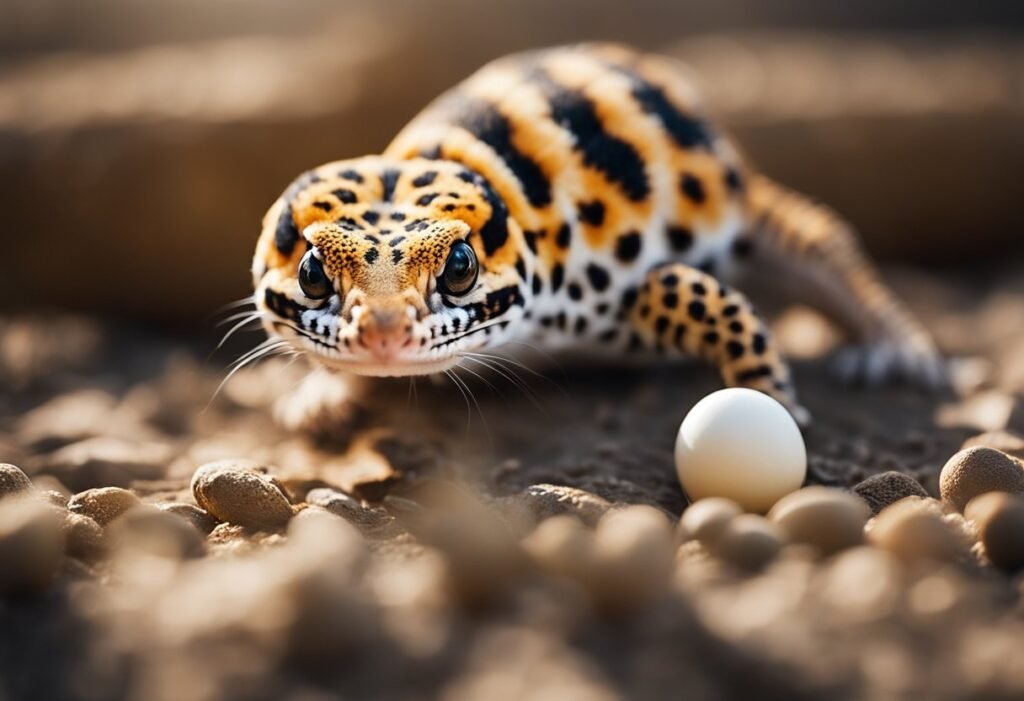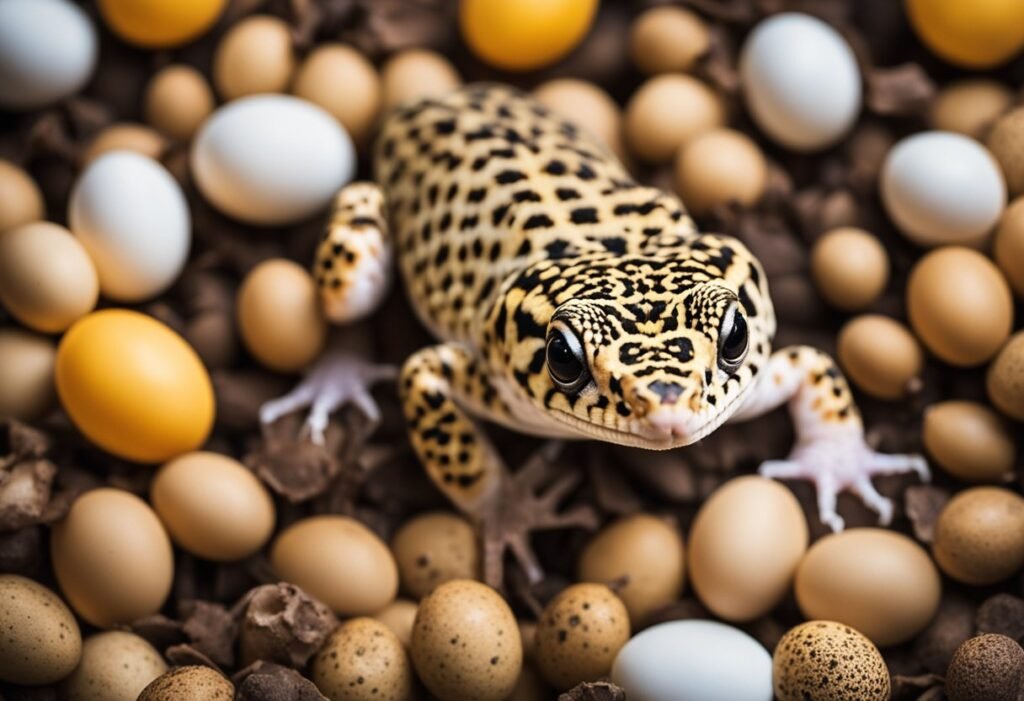Leopard geckos are a popular pet reptile for many people due to their docile nature and low maintenance requirements. As with any pet, it is important to provide them with a balanced and nutritious diet to ensure their health and well-being. One question that often arises is whether or not leopard geckos can eat raw eggs.

Raw eggs are a common food item for many reptiles, but it is important to understand the potential risks and benefits before feeding them to your leopard gecko. Eggs are a good source of protein and other nutrients, but they also carry the risk of bacterial contamination, such as salmonella. Additionally, feeding raw eggs too frequently can lead to an imbalance in your gecko’s diet and cause health problems. In this article, we will explore the pros and cons of feeding raw eggs to leopard geckos and provide recommendations for a healthy and balanced diet.
Leopard Gecko Dietary Basics

Leopard geckos are insectivores, meaning they primarily eat insects. However, they can also benefit from additional sources of protein and nutrients. In this section, we will discuss the nutritional requirements and feeding frequency and amount for leopard geckos.
Nutritional Requirements
Leopard geckos require a balanced diet of protein, fat, and carbohydrates. They also need calcium and vitamin D3 for proper bone health. Insects such as crickets, mealworms, and dubia roaches are excellent sources of protein for leopard geckos. It is important to gut-load the insects with a nutritious diet before feeding them to your gecko.
Leopard geckos can also benefit from occasional treats such as waxworms or superworms. However, these should not make up a significant portion of their diet as they are high in fat and low in other nutrients.
To ensure that your leopard gecko is getting enough calcium, you can dust their food with a calcium supplement. Additionally, providing a calcium dish in their enclosure can encourage them to consume the necessary amount of calcium.
Feeding Frequency and Amount
Leopard geckos should be fed every 2-3 days, with juveniles requiring more frequent feedings. The amount of food they need will depend on their age, size, and activity level. As a general rule, feed them as much as they can eat in 10-15 minutes.
It is important not to overfeed your leopard gecko as they can become overweight and develop health issues. Additionally, any uneaten insects should be removed from their enclosure to prevent spoilage and potential health problems.
By providing a balanced diet and feeding your leopard gecko the appropriate amount, you can help ensure their overall health and well-being.
Understanding Raw Eggs

When it comes to feeding leopard geckos, it’s important to know what foods are safe and nutritious for them. One food that some gecko owners may consider offering is raw eggs. In this section, we’ll take a closer look at the nutritional content of raw eggs and the potential health risks associated with feeding them to leopard geckos.
Nutritional Content of Raw Eggs
Raw eggs are a good source of protein, vitamins, and minerals. One large raw egg contains approximately 6 grams of protein, as well as vitamins A, D, E, and B12. Eggs also contain minerals like iron, zinc, and selenium.
However, it’s important to note that raw eggs also contain avidin, which can bind to biotin and prevent its absorption in the body. Biotin is an essential nutrient for leopard geckos, as it plays a role in maintaining healthy skin, hair, and nails. Therefore, it’s important to offer eggs in moderation and ensure that your gecko is getting enough biotin from other sources.
Potential Health Risks
Feeding raw eggs to leopard geckos can also pose some health risks. Raw eggs can be contaminated with bacteria like Salmonella, which can cause illness in both humans and animals. Additionally, the high fat content of egg yolks can lead to obesity and other health issues if fed in excess.
To minimize the risk of bacterial contamination, it’s important to handle raw eggs properly. Always wash your hands before and after handling eggs, and ensure that any utensils or surfaces that come into contact with raw eggs are thoroughly cleaned and disinfected. It’s also a good idea to offer cooked eggs instead of raw eggs, as cooking can help kill any harmful bacteria.
In conclusion, while raw eggs can provide some nutritional benefits for leopard geckos, they should be offered in moderation and with caution. Cooked eggs may be a safer option, and it’s important to ensure that your gecko is getting enough biotin from other sources.
Can Leopard Geckos Eat Raw Eggs
Leopard geckos are known for their unique dietary requirements. They are carnivorous reptiles that require a diet rich in protein and fat. Many owners wonder if they can feed their leopard geckos raw eggs. In this section, we will explore the digestive system compatibility and the risk of salmonella and other bacteria associated with feeding raw eggs to leopard geckos.
Digestive System Compatibility
Leopard geckos have a relatively simple digestive system that is adapted to digesting whole prey items. Their stomach acid is highly acidic, which allows them to digest bone and cartilage. However, leopard geckos lack the necessary enzymes to break down plant matter and certain types of proteins. Raw eggs are high in protein, but they also contain avidin, which binds to biotin and prevents its absorption. Biotin is an essential vitamin that is necessary for healthy skin, coat, and nails. Feeding raw eggs to leopard geckos can lead to biotin deficiency and other health problems.
Risk of Salmonella and Other Bacteria
Raw eggs can be contaminated with salmonella and other harmful bacteria. Leopard geckos are susceptible to salmonella infection, which can cause severe diarrhea, dehydration, and even death. Feeding raw eggs to leopard geckos increases the risk of salmonella and other bacterial infections. It is important to note that cooking eggs can kill harmful bacteria and make them safe for leopard geckos to eat.
In conclusion, leopard geckos should not be fed raw eggs due to the risk of biotin deficiency and salmonella infection. It is important to provide a balanced diet that meets their unique nutritional requirements. Leopard geckos can be fed a variety of live insects, such as crickets, mealworms, and waxworms, as well as commercially available reptile diets. If you have any concerns about your leopard gecko’s diet, it is best to consult with a veterinarian who specializes in reptile care.
Safe Foods for Leopard Geckos
As responsible pet owners, we want to make sure that our leopard geckos are getting the proper nutrition they need to thrive. One of the most important aspects of their diet is providing them with safe and nutritious foods.
Recommended Insects and Prey
Leopard geckos are insectivores, which means they primarily eat insects. Some of the best insects to feed your leopard gecko include:
- Crickets
- Mealworms
- Dubia roaches
- Waxworms (in moderation)
It’s important to make sure that any insects you feed your leopard gecko are gut-loaded, meaning they have been fed a nutritious diet before being fed to your gecko. You can also dust the insects with a calcium supplement to ensure your gecko is getting enough calcium.
Occasional Treats and Supplements
While insects should make up the majority of your leopard gecko’s diet, there are a few occasional treats and supplements you can offer to add variety and ensure your gecko is getting all the nutrients they need. These include:
- Pinkie mice (for adult geckos only)
- Hornworms
- Silk worms
- Phoenix worms
- Repashy Calcium Plus supplement
It’s important to note that while leopard geckos can eat raw eggs, it’s not recommended as a regular part of their diet. Raw eggs can contain harmful bacteria and should only be offered as an occasional treat.
Overall, providing a varied diet of safe and nutritious foods is key to keeping your leopard gecko healthy and happy.
Feeding Techniques
Preparing Food for Your Gecko
When it comes to feeding your leopard gecko, it is important to ensure that the food is prepared properly. Raw eggs are a great source of nutrition for your gecko, but they must be prepared correctly to avoid any potential health risks.
To prepare raw eggs for your gecko, crack the egg into a small dish and remove any shell fragments. You can then mix the egg with a small amount of calcium powder to provide additional nutrition for your gecko.
It is important to note that you should never feed your gecko eggs that have been cooked, as the heat can destroy important nutrients and proteins that your gecko needs to stay healthy.
Best Practices for Feeding
When feeding your leopard gecko raw eggs, it is important to follow a few best practices to ensure their health and safety.
First, make sure that the eggs are fresh and have not been sitting out at room temperature for an extended period of time. This can increase the risk of bacterial growth and potential illness for your gecko.
Second, be sure to clean and sanitize any dishes or utensils used to prepare the eggs to prevent the spread of bacteria.
Finally, monitor your gecko’s behavior and health after feeding them raw eggs. If you notice any changes in appetite, behavior, or overall health, it may be best to consult with a veterinarian to ensure that your gecko is healthy and receiving proper nutrition.
By following these simple feeding techniques and best practices, you can ensure that your leopard gecko receives the proper nutrition they need to stay healthy and happy.
Monitoring Your Leopard Gecko’s Health
As responsible pet owners, it is important to monitor the health of our leopard geckos regularly. This includes observing their behavior, physical appearance, and eating habits. Here are some tips on how to monitor your leopard gecko’s health:
Signs of Nutritional Deficiencies
Leopard geckos require a balanced diet to stay healthy. A diet lacking in essential nutrients can lead to various health problems. Here are some signs of nutritional deficiencies to look out for:
- Weight loss
- Stunted growth
- Weakness
- Lethargy
- Abnormal shedding
- Dehydration
- Soft bones or jaw
- Poor appetite
If you notice any of these signs, it is important to adjust your leopard gecko’s diet accordingly. Providing a variety of insects, as well as calcium and vitamin supplements, can help prevent nutritional deficiencies.
When to Consult a Veterinarian
If you notice any unusual behavior or physical symptoms in your leopard gecko, it is important to consult a veterinarian. Here are some signs that may indicate a health problem:
- Loss of appetite
- Diarrhea or constipation
- Difficulty breathing
- Abnormal growths or bumps
- Excessive shedding
- Unusual behavior, such as aggression or lethargy
A veterinarian who specializes in reptiles can help diagnose and treat any health problems your leopard gecko may have. Regular check-ups can also help detect potential health issues before they become serious.
By monitoring your leopard gecko’s health regularly and seeking veterinary care when necessary, you can help ensure a long and healthy life for your pet.
Frequently Asked Questions
What types of eggs are safe for leopard geckos to consume?
Leopard geckos can safely consume raw eggs from chicken, quail, and duck. It is important to note that the eggs should be fresh and free from any cracks or abnormalities.
Is it safe for leopard geckos to eat raw chicken?
Raw chicken is not recommended for leopard geckos as it can contain harmful bacteria such as salmonella. It is best to stick to other types of eggs as a source of protein.
Can leopard geckos have bird eggs in their diet?
Yes, leopard geckos can eat bird eggs as long as they are from a safe source and free from any defects. However, it is important to note that bird eggs should not make up a large portion of their diet.
Are there any risks associated with feeding leopard geckos raw eggs?
Feeding leopard geckos raw eggs can pose a risk of bacterial infection if the eggs are not fresh or if they are contaminated. It is important to handle the eggs carefully and wash your hands thoroughly before and after handling them.
What alternatives to raw eggs can be used for leopard gecko nutrition?
Leopard geckos can also be fed mealworms, crickets, and other insects as a source of protein. It is important to provide a varied diet to ensure they receive all the necessary nutrients.
How does the diet of crested geckos differ from that of leopard geckos regarding egg consumption?
Crested geckos do not typically consume eggs as part of their diet. They are primarily insectivores and should be fed a diet of crickets, mealworms, and other insects.





